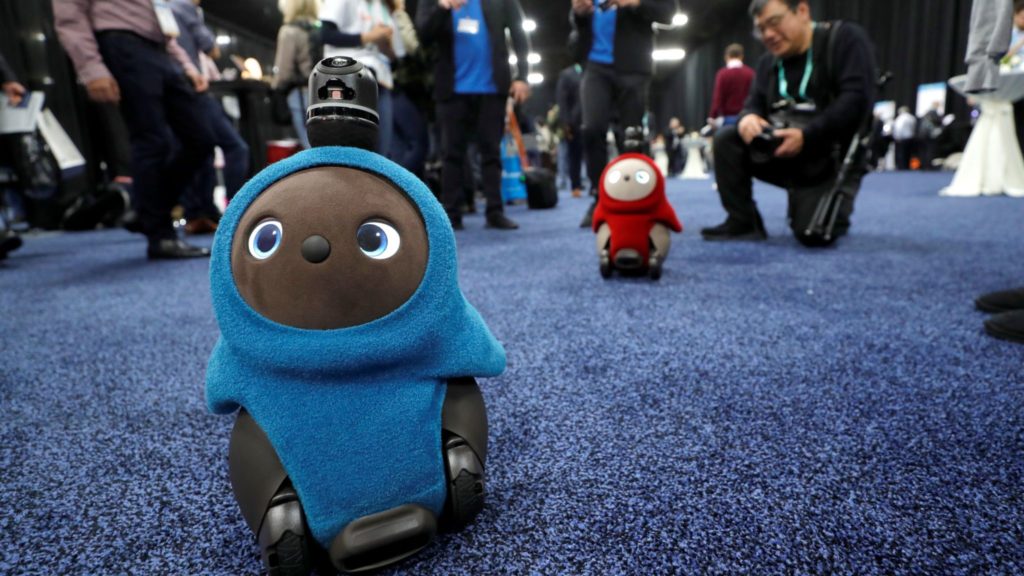This year’s Consumer Electronics Show (CES) in Las Vegas is under way, with some of the world’s weirdest devices on show.
The father of information theory, Claude Shannon, once said he was imagining a time when humans will be to robots what dogs are to humans, and confessed he was rooting for the machines.
It may be some time before robots replace humans, but going off the prevalence of robotic companions and gadgets at CES, robots might perhaps soon replace dogs.
And not just dogs – cats are in scope for replacement too.
Yukai Engineering is showing off a smaller and cheaper version of Qoobo, a cat-like robotic pillow with a tail which is designed to react differently depending on how its owners stroke it.

A price hasn’t been set for the Petit Qoobo, but the larger robotic pillow currently retails for $149 (£113) in the US.
The new smaller version will come with a microphone so it can potentially detect its owners’ comments as well as the ability to purr thanks to a haptic feedback device.
Reachy isn’t quite as cuddly as Qoobo but a bit more exciting for the hardcore nerds – as an open-source and modular robot, Reachy can be customised by its owners and programmed to perform different tasks.

Technically the Reachy robot itself is just a single arm which is designed like a human limb with seven degrees freedom of movement.
A premium version is available with two arms and a head, but whichever device consumers plump for they will be spending quite a lot – the single-arm version costs $9,000 while the full package could set you back around $17,000 (£13,000).
The robot comes with its own AI but developers will be able to use the Python programming language to create different applications.
Sample applications displayed by Pollen Robotics include the game tic-tac-toe. You’ll have to watch this space to see what the community develops for it next year.

Unsurprisingly, another Japanese robotics start-up has come up with the Lovot companion robot – and this one really wants to be loved.
Groove X first revealed Lovot last year, but this year one of the furry little bots is roaming around the conference floor begging attendants for love.
Lovot doesn’t speak, though, and doesn’t even have a mouth – instead the robot has two big eyes and arms that open wide as a request to be picked up and hugged, much like a real toddler.
But unlike a real toddler, the cost for a Lovot starts at just under ¥300,000, or over £2,000,
The Motion Pillow for snorers is also on show at CES, allowing both you and your loved one(s) to get a good night’s kip.
Made by Korean company Tenminds, the pillow comes with a patented sleep pressure monitoring system which senses where a sleeper’s head is positioned on the pillow.
Four airbags inside of the pillow can inflate and deflate and once snoring is detected the pillow will automatically, and gently, turn the user’s head to help them sleep.
According to the company, the pillow works throughout the entire night and comes with an app which tracks sleeping patterns as well.
Can you put a price on a good night’s sleep? It turns out Tenminds can. Their Motion Pillow is available for $389 (£295) on Amazon.

Mimic Go markets itself as the world’s smallest security system, allowing travellers to secure their areas and valuables anywhere, anytime, with one click.
It isn’t simply a location tracking tag, although it is that as well, but also an alarm which will go off is someone moves your laptop or opens a door.
According to Smart Mimic, the company behind the device, it uses LoRa network technology to stay connected to the internet, and can detect GPS and other positioning signals.
Available for $69 (£52), the device has a three-month battery life on a single charge, and its alarm sound can be set as high as 120 DB – basically painfully loud – to scare away thieves, and then sends an alert to your phone.

The smart helmet from Tali is a fine example of existing technology being put together for a stylish new purpose – although no cost is currently available.
Designed for motorcyclists, the helmet reacts to voice commands to allow riders to make calls and receive navigational instructions.
It comes with road lights including front and tail lights, and turning signals, and connects with the rider’s motorcycle to make sure the right signal is flashing. It also comes with real-time GPS tracking and ride analysis features.


